My introduction to gay Latvian affairs happened one afternoon in the office of LGBT organization Mozaika (Mosaic) the only LGBT organization in Latvia working for the protection of LGBT rights and human rights in Latvia. In 2005 following public homophobic expressions toward Riga Pride that year, some members of the LGBT community, their friends and family members united to push back and founded Mozaīka in order to promote tolerance towards sexual minorities. As a result, Mozaika became the sole umbrella organization for co-ordinating resistance to anti-LGBT activism in Latvia. (photo right: National Library)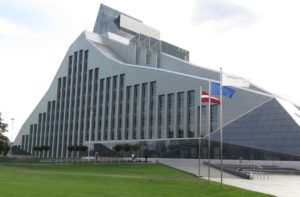
The cordial and friendly head of Mozaika—Kristine Garina— generously sat with me for an hour to describe the ups and downs of the organization in recent times. After it was started the organization has had an uneven history of success and near failure. Similar to the other two Baltic countries, Lithuania and Estonia, Gay Pride in the years before 2007 encountered strong homophobic opposition that prevented or disrupted visible and vocal celebrations of Pride. The major force behind such opposition was history: until 1991 these three small Baltic states were puppets of the oppressive Soviet bear that breathed on the lives of citizens here. Latvia gay life’s was threatened by the force of the Soviet regime that criminalized same-gender life and love.
Since its release from the Soviet sphere in 1991 Latvia has tried to free itself of repressive governance but homophobia has resisted the revisions. Although legal now, homosexuality still carries the stigma despite efforts by the parliament to change attitudes In September 2006, Latvia’s parliament, the Saeima, finally passed amendments to the Labor law banning discrimination on the basis of sexual orientation in workplaces. At first, parliament tried to ignore such protections (for sexual minorities) but President Vaira Vīķe-Freiberga refused to sign the bill until sexual minorities were added in the amendment. They were added and she signed. But laws don’t change attitudes quickly. Over time the level of homophobia has subsided from the violence against the first Gay Pride attempts in 2006-7 that prevented the event.
In 2015 EuroPride took place in Riga attracting around 5000 participants, while a few dozen participated in a protest meeting. In 2017 thousands gathered peacefully for BalticPride; there was hardly any anti-gay activity partly because the presence of police. (Latvia Pride site: www.pride.lv) (Gay Pride in the Baltic countries is called Baltic Pride (festival and parade) which rotates yearly among the three Baltic states. Europride is larger and rotates among a dozen European countries.)
“There has been a big change; no more broken windows or rocks thrown at us but we don;t have hate crimes laws to protect against homophobia in public despite the workplace protections. However, for the most recent Baltic Pride parade and festival there was a strong police presence that precluded any trouble from right wing homophobes,” said Kristine. Riot gear tends to keep opponents at a distance. A few eggs were thrown but those people were arrested and the parade carried on. (https://www.travelgayeurope.com/editorial/historic-europride-in-riga/)
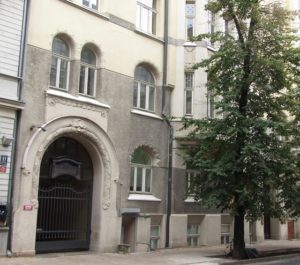 Currently Mozaika (photo left: Art Nouveau entry to Mozaika office) is going through a difficult time because the original contracts for funding its activities are expiring. NGO organizations like Mozaika are expected by donors (such as Soro’s Open Society Fund, Sweden’s RFSL and money from the Norway Grants association) to maintain themselves after a year or two of the initial launching. As the grants run out, Mozaika’s funding has nearly dried up. (To keep any donations coming is a full time job by a grant writer but Mozaika cannot afford one.) Now there is a shoestring staff and budget (provided by a few private donors). Rent for the office not been paid for several months: “we have a generous landlord,” said Kristine.
Currently Mozaika (photo left: Art Nouveau entry to Mozaika office) is going through a difficult time because the original contracts for funding its activities are expiring. NGO organizations like Mozaika are expected by donors (such as Soro’s Open Society Fund, Sweden’s RFSL and money from the Norway Grants association) to maintain themselves after a year or two of the initial launching. As the grants run out, Mozaika’s funding has nearly dried up. (To keep any donations coming is a full time job by a grant writer but Mozaika cannot afford one.) Now there is a shoestring staff and budget (provided by a few private donors). Rent for the office not been paid for several months: “we have a generous landlord,” said Kristine.
All staff are volunteer for now and even Kristin has to find income for herself outside Mozaika. Despite this hardship, determined Moziaka has stayed active and has conducted research for ILGA about hate crimes against vulnerable minorities in Latvia as well as providing awareness-raising training for police in towns that ask for it. Other minorities are also also included in the training, such as Jews and trans people. Kristine said “the government keeps trying to deny LGBT community’s existence (there’s a lack of HIV prevention programs) but this will change,” Kristine hopes, “as our country becomes more influenced by the EU—especially from Berlin. It’s not that far away (1200 km; 750 miles) and our leaders cannot ignore what’s happening there. Even Poland is changing to be more gay friendly.”
Unfortunately, negative changes are happening as well. Despite improvements in health care to all citizens, there is a serious drug epidemic in Europe; one observer commented that now most HIV cases are drug users not LGBT people.
Remarkably, Mozaika still manages to maintain a youth support group is called Skapis (closet) that meets each week at the Mozaika office. The group offers a lifeline for young people trying to find their way out. No adults are allowed except the facilitator, gender non-binding Elina. Most kids are 16 to 20; attendance averages about 20. Activities include group discussion, individual counseling, films, outings to social events, viewing videos (RuPaul drag shows are a favorite). Kristin reports that younger people seem more confident today than ever before, a phenomenon that appears to be happening all over western Europe as young people reach majority age.
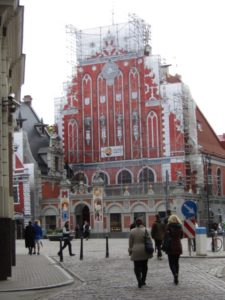 Also, said Kristine, Latvians still suffer from Soviet paranoia about scarcity and do not give to charities generously: “there’s a heritage of fear.” Mozaika also provides HIV testing by volunteer doctors at the Mozaika office. There has been HIV testing outreach to the gay bars—now, there’s only one bar, Top Club. Riga is a city of over 400 thousand people but has only a small LGBT community in public. Most socializing is done among friends in informal settings like homes or restaurants. Homophobia still effects most LGBT people to keep a low profile. However a notable boost to the community was Latvia’s Foreign Minister, Edgars Rinkevies, who came out publicly in 2015; he receive approval from the Estonian president, the vice-president of the EU and from the Latvian President Raimonds Vejonis. (photo right: Blackheads Baroque building in Riga)
Also, said Kristine, Latvians still suffer from Soviet paranoia about scarcity and do not give to charities generously: “there’s a heritage of fear.” Mozaika also provides HIV testing by volunteer doctors at the Mozaika office. There has been HIV testing outreach to the gay bars—now, there’s only one bar, Top Club. Riga is a city of over 400 thousand people but has only a small LGBT community in public. Most socializing is done among friends in informal settings like homes or restaurants. Homophobia still effects most LGBT people to keep a low profile. However a notable boost to the community was Latvia’s Foreign Minister, Edgars Rinkevies, who came out publicly in 2015; he receive approval from the Estonian president, the vice-president of the EU and from the Latvian President Raimonds Vejonis. (photo right: Blackheads Baroque building in Riga)
Mozaika is also involved in refugee work to help survivors of persecution in some Russian provinces. The work is shrouded in secrecy for now until the refugees can gain official asylum status which offers legal protection and public services. Money is provided by individuals in Riga who appreciate the plight of persecuted victims of brutal and violent regimes. Kristine asked me not to name the province or describe any details about their refugee protection effort. One of the current refugees is a medical doctor who is gay. Needless to say his/her case is very sensitive.
Personal Story
In my online research and in-person visit to Mozaika (which included a walk-around in the historic center of Riga) I found this testimony of a young gay man expressing his new-found freedom of being ‘other’, of not being in the usual male growth stream in Latvia. His name is Raimi. He titled his testimony ‘Life outside the closet is really very beautiful and relaxing’ which he posted on October 1, 2017:
“My name is Raimond, but my true friends always call me Raimi. I’m an ordinary guy living in Latvia. Some time ago I “got out of the closet”. Of course I have a partner. A beautiful and brave guy who also lives in Latvia, my bunny. I want to tell you my story of love and how well it is to live outside the closet.
Yup! We are together, in spite of nothing, even if homophobia prevails!
“The guys began to sympathize with me from the teenage age. The wise and sympathetically young men got my understanding of joy and happiness. It was not a sexual pleasure, but an aesthetic appeal. As tiny I could not decipher this feeling. That was something I could not explain. It can be compared to butterflies in the stomach. I grew up at a time when the “Russian time” was still a short time, in which the gays have always been “enemies”. My mother, I love so much, because I, my loving son, will be there for whatever happens. My father is not aware of my sexual orientation and I think that he is also undisclosed because we rarely meet.
“I have often been subjected to pressure: “You must meet your girlfriend”, “You must have children,” “You must be interested in women,” etc. I even feared to fall in love. I even tried to tear off the “making all this homo” at times, went to meet girls and started meeting with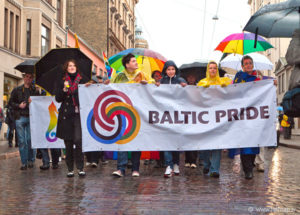 them. But that did not help. After several such “healings,” I said to myself, “Yes, I’m gay, and I’m ready to live with it, because I’m the same as other people!”
them. But that did not help. After several such “healings,” I said to myself, “Yes, I’m gay, and I’m ready to live with it, because I’m the same as other people!”
“I met my lover on one social site, wrote a couple of days and we had an appointment. The first thing I thought to myself when he saw him: “Wow, I would like more than just sex with this guy.” We had a wonderful night under the open sky, and believe it or not – just talking. And so it happened for several days and nights, despite the fact that we had jobs.
“As we know, Latvian law does not currently recognize us as close people to each other. If my partner gets sick, I can not be close to him, and I can not decide on his treatment. In addition, some political parties in Latvia have a high degree of propaganda. But why sacrifice our love for homophobia? It will never happen !!!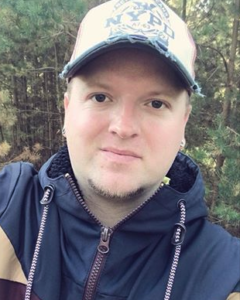
“Therefore, I invite everyone not to hide, to show their love, because we live only once and will not let it be limited.
Many heterosexuals say “stop to turn out”, but where is the show ?! Why homosexuals can not afford to walk with their hands together, giving a kiss?! Why homo people are forced to observe the expression of heterosexual love? Unfortunately, we livedin the Soviet Union, “left” in society, which continues to fall. Moreover, even worse, if someone interrupts the faith, then the hands are simply lowered.
“Dear people, if you think a little bit about how it would be if it affects you ?! Love is united by people, and therefore try to understand all your fellow humans.”
From Raimonds Petrovics (photo left)
Further Issues
Time changes everything, from small details to major social events. Today, LGBT cultural, educational and other activities can be held without hiding and lifestyles can be freely expressed, although cautiously. Latvian society has not reached a high level of acceptance toward same-sex marriage or any form of same-sex partnership despite the wave of marriage equality happening further west in Europe. Unfortunately, in 2006 the Latvian parliament amended its constitution to prohibit same-sex marriage. Only 12% of Latvians surveyed, then, supported same-sex marriage 2006. It is highly likely this will change in the next five years.
Both male and female same-sex sexual activity have been legal since 1992 immediately following freedom from anti-gay Russia, However, households headed by same-sex couples are not eligible for the same legal protections available to opposite-sex couples. Progress comes in pieces as minds come around to acknowledging homosexuality as a valid part of Latvian life.
As recently as 2015 there were two gay clubs/bars, Golden and XXL. Today both are closed and have been replaced by one new bar called Top Club in the same location as XXL. (https://www.facebook.com/TopClubRig/?hc_ref=ARRr8FpEH1Jx2eGkRJPA6HYNw0OYXhBwAwK86WkZUflLqXMEArS-j-Nh3i7LcbitxHA&pnref=story).
The stunning architecture still remains for the viewing pleasure of countless visitors. Old town Riga has one of the most extensive and beautifully preserved collection of Art Nouveau buildings anywhere. The place looks life a huge outdoor museum.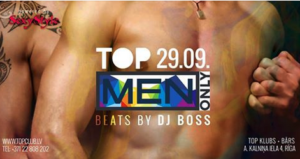
Anti-gay attitudes persist at the institutional level as various religious groups and politicians maintain a prejudice against LGBT; homosexuality and pedophilia are irrationally linked phenomena in their minds. In 2002, an openly gay minister, Māris Sants, was defrocked and excommunicated from the Evangelical Lutheran Church of Latvia.
Gays and lesbians are allowed to serve openly in the military. Citizens have the right to change their gender. Access to IVF for is available for lesbians.
Commercial surrogacy for gay male couples is possible. MSMs are allowed to donate blood.
















